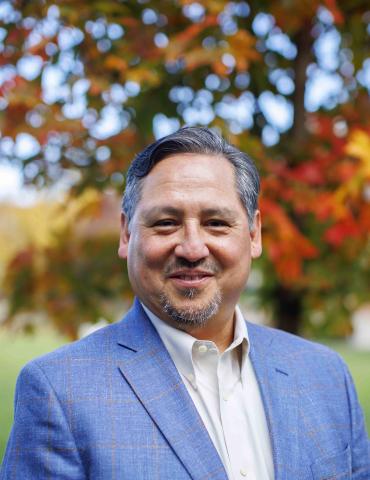
Joseph Gone, Ph.D.
Joseph P. Gone is the Faculty Director of the Harvard University Native American Program and an international expert in the psychology and mental health of American Indians and other Indigenous Peoples. A professor at Harvard University, Dr. Gone has collaborated with tribal communities for 30 years to critique conventional mental health services and to harness traditional culture and spirituality for advancing Indigenous well-being. As a clinical-community psychologist and action researcher, he has published over 120 scientific articles, and received recognition in his fields through more than 25 fellowships and career awards, including a Guggenheim Fellowship. Dr. Gone is a graduate of Harvard College and the University of Illinois, and he also trained at Dartmouth College and McLean Hospital/Harvard Medical School. He taught at the University of Michigan in Ann Arbor for sixteen years, where he directed the Native American Studies program prior to joining the faculty at Harvard. An enrolled member of the Aaniiih-Gros Ventre Tribal Nation of Montana, he also served briefly as the Chief Administrative Officer for the Fort Belknap Indian reservation. He is currently a Fellow of the Association for Psychological Science, and of seven divisions of the American Psychological Association. In 2023, Gone received a Gold Medal Award for Impact in Psychology from the American Psychological Foundation. He is an elected member of the National Academy of Medicine.
Joseph P. Gone is Professor of Global Health and Social Medicine (in the Faculty of Medicine) and Professor of Anthropology (in the Faculty of Arts and Sciences) at Harvard University. As an interdisciplinary social scientist with both theoretical and applied interests, Professor Gone has collaborated for 30 years with American Indian and other Indigenous communities to rethink community-based mental health services and to harness traditional culture and spirituality for advancing Indigenous well-being. He does so from the perspective of a scholar who is trained in health service psychology, inspired by anthropology-style interpretive analysis, and committed to participatory research strategies. An enrolled member of the Aaniiih-Gros Ventre Tribal Nation of Montana, Gone has attended to the distinctive cultural psychologies of Indigenous communities to identify local concepts of wellness and distress, to uncover the logics of Indigenous therapeutic traditions, to reframe clinical care with respect to Indigenous traditional knowledges, and to reimagine mental health services toward greater benefit for these populations. Examples of Professor Gone’s projects include comparisons of specific facets of Indigenous cultural psychology with the logics of the mental health professions; critical analysis of the concept of Indigenous historical trauma; collaborative development of the Blackfeet Culture Camp for community-based treatment of addiction; and commissioned formulation of the Urban American Indian Traditional Spirituality Program for orienting urban Indigenous peoples to traditional spiritual practices. These investigations have entailed intimate familiarity with modern Indigenous lives and settings, open-ended investigation of local and emergent Indigenous understandings, adaptable presentation of research findings for both academic and community constituencies, and an intrepid dedication to unsettling the orthodoxies cherished by any of Professor Gone’s audiences.
Am J Community Psychol
View full abstract on Pubmed
Psychotherapy (Chic)
View full abstract on Pubmed
Health Res Policy Syst
View full abstract on Pubmed
Am J Community Psychol
View full abstract on Pubmed